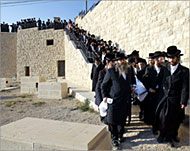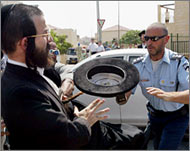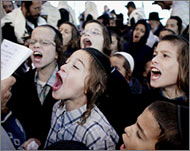Kosher feud polarises Israeli society
Dozens of corner stores across Israel are at the centre of a divisive legal battle which is tearing apart the traditional consensus about the character of the Jewish state and who should be considered a Jew.

Gennady Ozadovsky’s Super Ta’anug store – in the city of Karmiel in northern Israel – is one of them.
It has shelves stuffed with everything from hummus, pretzels and pitta bread, to low-fat yoghurt and beer. For the world it looks like any other corner supermarket in Israel.
Ozadovsky, an immigrant from the former Soviet Union, has offended the sensibilities of his religious neighbours by stocking non-kosher products in his shop, including pork meat, sausages and shellfish.
In response the local municipality, which passed a bylaw against the sale of non-kosher food decades ago, has been trying to close him down.
Major victory
This month a petition to the High Court of Justice by several secular members of the Israeli parliament, Knesset, resulted in a major victory for shopkeepers like Ozadovsky .
In a unanimous decision, the judges ordered local authorities to change their bylaws to allow the sale of non-kosher meat. The judges ruled that the councils must take account of local feeling and allow the sale of pork in neighbourhoods where there was demand for it.
 |
|
There is no consensus as yet on |
The feud over the sale of pork has been become increasingly fraught – and emblematic of a much bigger battle – in the past 10 years, since the arrival of some one million immigrants following the break-up of the Soviet Union in the early 1990s.
These “Russians”, as they are universally referred to in Israel, are rarely observant Jews and many brought with them spouses who were not considered Jewish either under religious codes (halakha) or under the more liberal definition that applies in legislation governing immigration to Israel, the Law of Return. Many even considered themselves Christian.
The figure cited by Israeli authorities is that at least 300,000 of the Russian immigrants are not Jewish by any criteria at all. A recent study in Russia suggested that in 2000 only 27 per cent of those emigrating to Israel could be classified as Jewish.
Knesset battle
These secular and non-Jewish Russians have settled in large numbers in established Israeli communities, thereby challenging the dominance of the existing inhabitants.
The biggest flashpoints have been in Tiberias and Karmiel in the Galilee and Beit Shemesh near Jerusalem. There, in the late 1990s, a backlash from local rabbis and religious inhabitants led to angry demonstrations outside shops with protesters waving placards and shouting, “Pigs, go back to Russia!”
 |
|
The influx of secular Russians is |
After the recent ruling the mayor of Beit Shemesh, Moshe Abutbul, said: “All we want is that they [the Russians] should behave like Jews. Is that a lot? We aren’t in Leningrad and we aren’t in Moscow.”
Already the fight over pork is heading back to the Knesset, where legislators belonging to the ultra-Orthodox community, known as the Haredi, are being forced on to the defensive.
MK Igal Yassinov, of the stridently secular Shinui party, threatened last week to survey workers in the Knesset to see whether a majority favoured pork and other non-kosher food being sold in the building’s restaurant.
During a Knesset debate he taunted the Haredi parties, saying: “We are no less good Jews than you, and maybe even better. I don’t tell you what to do, and you should not tell us what to do.”
In response the Haredi parties are threatening to introduce legislation banning the sale of all non-kosher meat inside Israel.
Fragile consensus
The argument would be less inflammatory if it didn’t reflect a much larger and even more divisive struggle within Israel over the definition of who should be considered a Jew.
Eli Yishai, chairman of the ultra-Orthodox party Shas, described the judges’ ruling in apocalyptic terms. “The High Court has driven a central nail in the coffin of Jewish identity in the state,” he told Israel Radio.
The dispute threatens to tear apart the fragile Jewish consensus that has existed since the state’s founding in 1948.
|
“All we want is that the Russians should behave like Jews. Is that a lot? We aren’t in Leningrad and we aren’t in Moscow” |
Then, the Orthodox rabbinate managed to extract from the secular Zionist leadership an agreement giving them exclusive control over personal status laws, such as those governing marriage, divorce and death, and the right to define who is a Jew for public records.
The rabbinate also requires public and government offices to observe the Sabbath and kosher laws and controls the conversion process for non-Jews. The two other main streams of Judaism, Conservative and Reform, have little influence on Israeli life.
The Orthodox rabbinate’s stranglehold on all the “Jewish” aspects of life in the state has left the Russians – a fifth of the population – largely out in the cold. Although they are expected to serve and fight in the army in the interests of the Jewish state, they find the state reluctant to return the favour.
Identity crisis
The result is a social explosion in the making.
The Russian community has not been integrated into Israeli society: they still live in their own neighbourhoods, watch Russian television and are often unable to speak Hebrew.
 |
|
All ‘Jewish’ aspects of life remain |
Already there are hundreds of cases of Russian couples unable to marry in Israel where there is no civil marriage. Jewish weddings are under the control of Orthodox rabbbinate, but they refuse to marry off anyone who is not defined as Jewish under halakha. Instead couples are forced to travel abroad, typically to Cyprus, to wed.
The problem will only grow as more young Russians reach marriage age. Their offspring, who will also not be Jewish under halakha, will be ineligible to marry in Israel too.
There have also been numerous cases during the intifada of Russian soldiers killed in action being refused burial in Jewish graveyards. There is continuing bitterness over a decision to bar Russian teenagers killed in the Dolphinarium suicide attack in Tel Aviv in June 2001 from consecrated ground.
On several occasions the death of a Russian has led to deportation proceedings being enforced against a non-Jewish spouse or dependants.
Continuing dilemma
The legal discrimination against many Russians might at least be partially reversible were conversion open to them. But the Orthodox rabbinate only allows a few hundred people to convert in Israel each year.
|
“I’m proud of being Russian. It is humiliating to me to turn myself into something I’m not” a recent Russian immigrant to Israel quoted in opinion survey |
In any case most do not want to convert. A poll presented this month by Marina Niznick of Bar Ilan University found that few recent Russian immigrants considered their identity Jewish. “I’m proud of being Russian,” said one. “It is humiliating to me to turn myself into something I’m not.”
Still, the continuing dilemma of the community is written on even corner-store fronts. Ozadovsky, the shopkeeper in Karmiel, said he has always made sure his shop did nothing to offend religious sensibilities.
“We don’t have any signs up,” he said, “apart from advertising in Russian that we sell ice cream from Russia.”